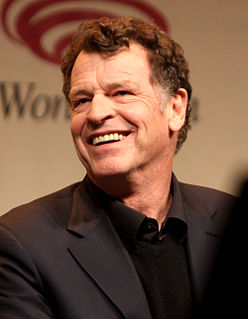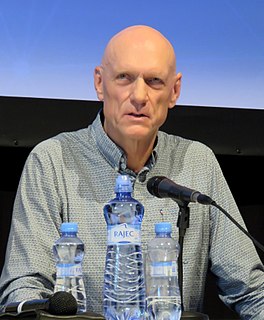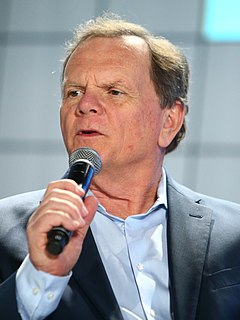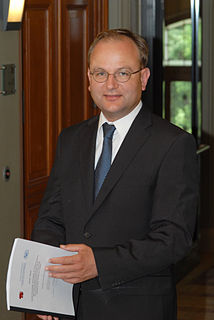Top 1200 Environmental Science Quotes & Sayings - Page 3
Explore popular Environmental Science quotes.
Last updated on November 24, 2024.
This is a timely and relevant initiative. The environmental challenges facing Singapore and the region are becoming more complex. Tackling them will require inter-disciplinary approaches combined with a good understanding of science, economics and governance aspects. The NUS Bachelor of Environment programme will fill a much needed gap in the current framework. NEA is pleased to be a partner to this programme.
The "environmental movement" is becoming an economic movement, is joining the social justice movement, is becoming a sustainability movement. It's leaving behind the "People's Needs versus Nature's Needs" conflict in favor of making the case for environmental health as the essential underpinning of prosperous and stable human civilization.
Another of the qualities of science is that it teaches the value of rational thought, as well as the importance of freedom of thought; the positive results that come from doubting that all the lessons are true... Learn from science that you must doubt the experts. As a matter of fact, I can also define science another way: Science is the belief in the ignorance of experts.
We think the problem is out there, when the problem is really in here - who we are and how we experience the world around us. The acoustic ecologist listens, as the primary sense, to the world around us, and I believe that they have a significant contribution to make to all environmental groups who think that they're solving environmental problems, when we're actually all on a spiritual pilgrimage.
As currently written, the laws require certain manufacturers and users of such chemicals to report any and all environmental releases-either accidental or routine-to air, water, or soil. The Toxics Release Inventory is the main registry of such events, and it is available to the public through the Environmental Protection Agency. It is hardly comprehensive. Toxic emissions reported to the federal government are thought to account for only 5 percent of all chemical releases.
Science fiction is a weird category, because it's the only area of fiction I can think of where the story is not of primary importance. Science fiction tends to be more about the science, or the invention of the fantasy world, or the political allegory. When I left science fiction, I said "They're more interested in planets, and I'm interested in people."
Gradually, ... the aspect of science as knowledge is being thrust into the background by the aspect of science as the power of manipulating nature. It is because science gives us the power of manipulating nature that it has more social importance than art. Science as the pursuit of truth is the equal, but not the superior, of art. Science as a technique, though it may have little intrinsic value, has a practical importance to which art cannot aspire.
A precondition for being a science fiction writer other than an interest in the future is that, an interest - at least an understanding of science, not necessarily a science degree but you must have a feeling for the science and its possibilities and its impossibilities, otherwise you're writing fantasy. Now, fantasy is also fine, but there is a distinction, although no one's ever been able to say just where the dividing lines come.
It is science alone that can solve the problems of hunger and poverty, of insanitation and illiteracy, of superstition and deadening custom and tradition, of vast resources running to waste, or a rich country inhabited by starving people... Who indeed could afford to ignore science today? At every turn we have to seek its aid... The future belongs to science and those who make friends with science.
Global warming is not only the number one environmental challenge we face today, but one of the most important issues facing all of humanity... We all have to do our part to raise awareness about global warming and the problems we as a people face in promoting a sustainable environmental future for our planet.
But no matter how big the effort to push a propaganda line might be, climate change is bigger. This, undoubtedly and regrettably, is the biggest immediate long-term environmental challenge we face. A failure to concretely come to some policy outcome on climate change has not only a negative environmental impact but also social and economic consequences for us.
A lot of environmental and biological science depends on technology to progress. Partly I'm talking about massive server farms that help people crunch genetic data - or atmospheric data. But I also mean the scientific collaborations that the Internet makes possible, where scientists in India and Africa can work with people in Europe and the Americas to come up with solutions to what are, after all, global problems.
Professionalism is environmental. Amateurism is anti environmental. Professionalism merges the individual into patterns of total environment. Amateurism seeks the development of the total awareness of the individual and the critical awareness of the ground rules of society. The amateur can afford to loose.
Science has only two things to contribute to religion: an analysis of the evolutionary, cultural, and psychological basis for believing things that aren't true, and a scientific disproof of some of faith's claims (e.g., Adam and Eve, the Great Flood). Religion has nothing to contribute to science, and science is best off staying as far away from faith as possible. The "constructive dialogue" between science and faith is, in reality, a destructive monologue, with science making all the good points, tearing down religion in the process.
By the time [of modern] generation was coming of age sexually, there was already this idea of safe sex. But that didn't exist for me. I came out of the free-swinging '60s and '70s. It was free love, baby. That was it. We had very liberal sex-ed classes in 1973, a yearlong environmental science class, and then Women's Lib and Gay Liberation. So it's insane to go from that to Reagan and AIDS. It was like, "What happened? Where's my future?"
To bring the tools of science and to recognize that the flaw in the Cartesian Duality and to bring the tools of science to look at this question of mind and consciousness and to explore it using the tools of science â€" instead of saying, as has been the tradition for 400 years, that consciousness is not a proper subject for science to look at.
Science is like society and trade, in resting at bottom upon a basis of faith. There are some things here, too, that we can not prove, otherwise there would be nothing we can prove. Science is busy with the hither-end of things, not the thither-end. It is a mistake to contrast religion and science in this respect, and to think of religion as taking everything for granted, and science as doing only clean work, and having all the loose ends gathered up and tucked in. We never reach the roots of things in science more than in religion.
Mathematics has two faces: it is the rigorous science of Euclid, but it is also something else. Mathematics presented in the Euclidean way appears as a systematic, deductive science; but mathematics in the making appears as an experimental, inductive science. Both aspects are as old as the science of mathematics itself.
For decades, I thought that scientific truth, solid economic case studies, and common sense were enough to bring about change on the environmental front. After all, the data is so compelling! I thought that if people just understood the severity of today's environmental threats and knew about available solutions, those solutions would happen. Not so.
The concept of national sovereignty has been an immutable, indeed sacred, principle of international relations. It is a principle which will yield only slowly and reluctantly to the new imperatives of global environmental cooperation. It is simply not feasible for sovereignty to be exercised unilaterally by individual nation states, however powerful. The global community must be assured of environmental security.
Science and vision are not opposites or even at odds. They need each other. I sometimes hear other startup folks say something along the lines of: 'If entrepreneurship was a science, then anyone could do it.' I'd like to point out that even science is a science, and still very few people can do it, let alone do it well.
Perhaps the central question about [Eliot] Porter's work is about the relationship between science, aesthetics, and environmental politics. His brother, the painter and critic Fairfield Porter, wrote in a 1960 review of [Porter's] colour photographs: 'There is no subject and background, every corner is alive,' and this suggests what an ecological aesthetic might look like.
Economic growth and environmental preservation are two sides of the same coin. There's no better illustration of that point than the California Clean Tech Open, which challenges California entrepreneurs to bring new, clean technologies to market. I encourage business leaders, policy makers, and environmental advocates to support this innovative, exciting competition.
My parents didn't know much science; in fact, they didn't know science at all. But they could recognize a science book when they saw it, and they spent a lot of time at bookstores, combing the remainder tables for science books to buy for me. I had one of the biggest libraries of any kid in school, built on books that cost 50 cents or a dollar.
First of all, developed countries have basically expropriated the atmosphere of the world community. But one must say clearly that we redistribute de facto the world's wealth by climate policy. Obviously, the owners of coal and oil will not be enthusiastic about this. One has to free oneself from the illusion that international climate policy is environmental policy. This has almost nothing to do with environmental policy anymore.






















































